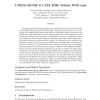42 search results - page 8 / 9 » Word-Sense Disambiguation Using Decomposable Models |
COLING
2010
12 years 11 months ago
2010
Word Sense Disambiguation (WSD) often relies on a context model or vector constructed from the words that co-occur with the target word within the same text windows. In most cases...
ACL
2006
13 years 6 months ago
2006
Most approaches to event extraction focus on mentions anchored in verbs. However, many mentions of events surface as noun phrases. Detecting them can increase the recall of event ...
CLEF
2009
Springer
13 years 5 months ago
2009
Springer
This paper presents the participation of the semantic N-levels search engine SENSE at the CLEF 2009 Ad Hoc Robust-WSD Task. During the participation at the same task of CLEF 2008,...
LREC
2008
13 years 6 months ago
2008
We present new direct data analysis showing that dynamically-built context-dependent phrasal translation lexicons are more useful resources for phrase-based statistical machine tr...
JMLR
2011
12 years 11 months ago
2011
We propose a framework MIC (Multiple Inclusion Criterion) for learning sparse models based on the information theoretic Minimum Description Length (MDL) principle. MIC provides an...

